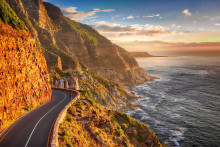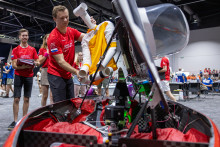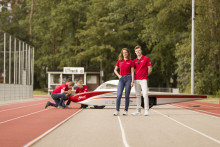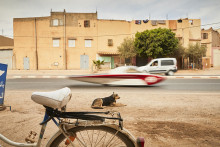The Sasol Solar Challenge starts in exactly one month. What is the status of the preparations?
Pouwels: 'Last weekend the first group flew to South Africa, a second group will follow on Wednesday. Most of us will fly on Tuesday 20 August, when the transport box with our car will also arrive by boat. In total we are coming to South Africa with 37 people. We already talk a lot about the competition with each other. A group is still working on some technical innovations that we need to test a few times. That's always a bit exciting, but otherwise we're generally ready for the start.'
The race is known as one of the most challenging sun races in the world. Why is that?
'In Australia, we are used to driving from A to B as quickly as possible. Here, the goal is to cover as many kilometers as possible. You do this by making extra rounds along the way. The distance from the starting point Johannesburg to the finish in Cape Town is about 2500 kilometers. The team from Delft won in 2022 by covering no less than 4200 kilometers. Extra mileage provides extra excitement and challenge. You take risks. Are we making an extra round? And how much? Does that outweigh any penalty time if you're late?'
What else is the race different from Australia?
'Actually, in everything. We don't drive five, but eight stages, which is much more intensive for the car. We also pass through five ecozones. We drive through desert, humid areas, along the coast and through the mountains. The knowledge of our predecessors is valuable, but we have to invent a lot ourselves for this competition. Also, the weather in South Africa is unpredictable. We collect as much data as possible, but you never quite know what to expect. Moreover, the weather in Cape Town can be completely different from that in Johannesburg. What is an advantage: there is no time difference. That makes communication with the Netherlands easier and saves jet lag.'
South Africa is not known as a very safe country. To what extent do you take that into account?
'Until the race, for example, we are not staying in Johannesburg, but in a town to the east of the metropolis that is not equally safe everywhere. We have our workplace and accommodation on the campus of a university. All our protocols have been rewritten, so we always make sure that someone is not alone. We also had a meeting with the Dutch embassy in South Africa, in which we were given an explanation of what to do and what not to do. During the race, we trust the organization. There is a marshal with each team and a safety team is always available. And we don't sleep on the side of the road like in Australia, but stay every night with all the teams at a secure camp location.'
You won in Morocco in 2021, last year it was silver in Australia. What is the purpose in South Africa?
'We're making our debut, so a lot is unknown, but we're going for the win. Riding in the mountains went very well for us in Morocco, hopefully we can make the difference in those stages. Our competitors from Delft and Leuven are also present. They've been in this race before, so I'm expecting an exciting battle. Our car is good and we hope to start strong. We left something out there in Australia. Hopefully we'll get away well now and we can get the most mileage of all the teams.'
The Sasol Solar Challenge starts on Friday 13 September in Johannesburg. The finish is a week later in Cape Town. The race can be followed via utoday.nl or in our app (iOS or Android).







